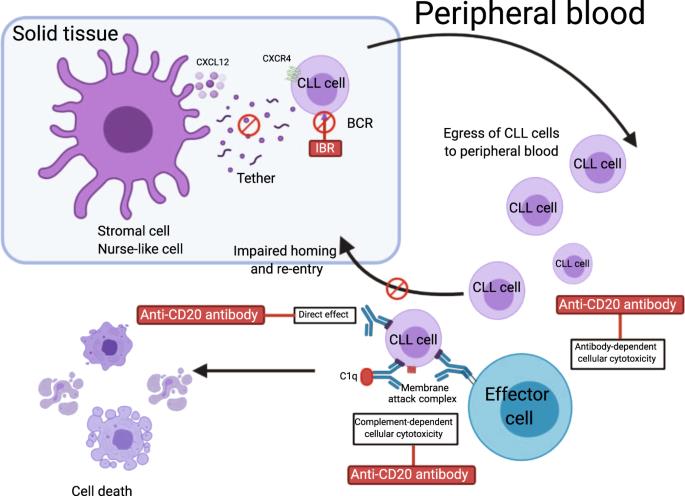From Blood Cancer Journal 29th April 2021
Four strategies have been tested in recent years with combinations of ibrutinib with immunotherapy, chemoimmunotherapy, cell therapy, and other targeted therapy. Here, they review the scientific rationale for and clinical outcome of each strategy.
Among these strategies, ibrutinib with targeted agent venetoclax results in high complete response rates and, importantly, high rates of undetectable minimal residual disease. Although they concentrate on ibrutinib, similar combinations are expected or ongoing with acalabrutinib, tirabrutinib, and zanubrutinib, all second-generation BTK inhibitors.
While single-agent ibrutinib was a remarkable addition to the CLL pharmacopeia, results from combinations of ibrutinib and other agents have been even more promising. Particularly, early data from studies of the combination of ibrutinib with other targeted agents, such as venetoclax, show deep responses resulting in high CR rates and, importantly, high rates of undetectable MRD.
This progress is providing us an opportunity to test fixed-duration therapy and an MRD-guided approach to discontinuation of treatment for patients with CLL. Time-limited treatment would be more cost-effective than regimens that must be used continuously until the disease progresses. MRD status and the velocity of attaining remission allow identification of patients with a low risk of relapse who do not require continuation of treatment.
More selective BTK inhibitors, such as acalabrutinib, tirabrutinib, and zanubrutinib, are being tested in similar combinations. Further, the use of combination strategies to target different elements of the pathophysiology of CLL at an early stage may result in lower rates of emergence of drug-resistant clones. Long-term results will provide this long-needed information.
Future investigations will focus on the feasibility of discontinuing ibrutinib combinations after a defined time; the therapeutic benefit of adding a third agent to ibrutinib-containing combinations and the profiling of resistant clones that develop after combination treatment.
A new standard of care for CLL is expected to emerge from these investigations.
Lots more detail here and some excellent schematics illustrating the dynamics of each approach
nature.com/articles/s41408-...
Jackie

